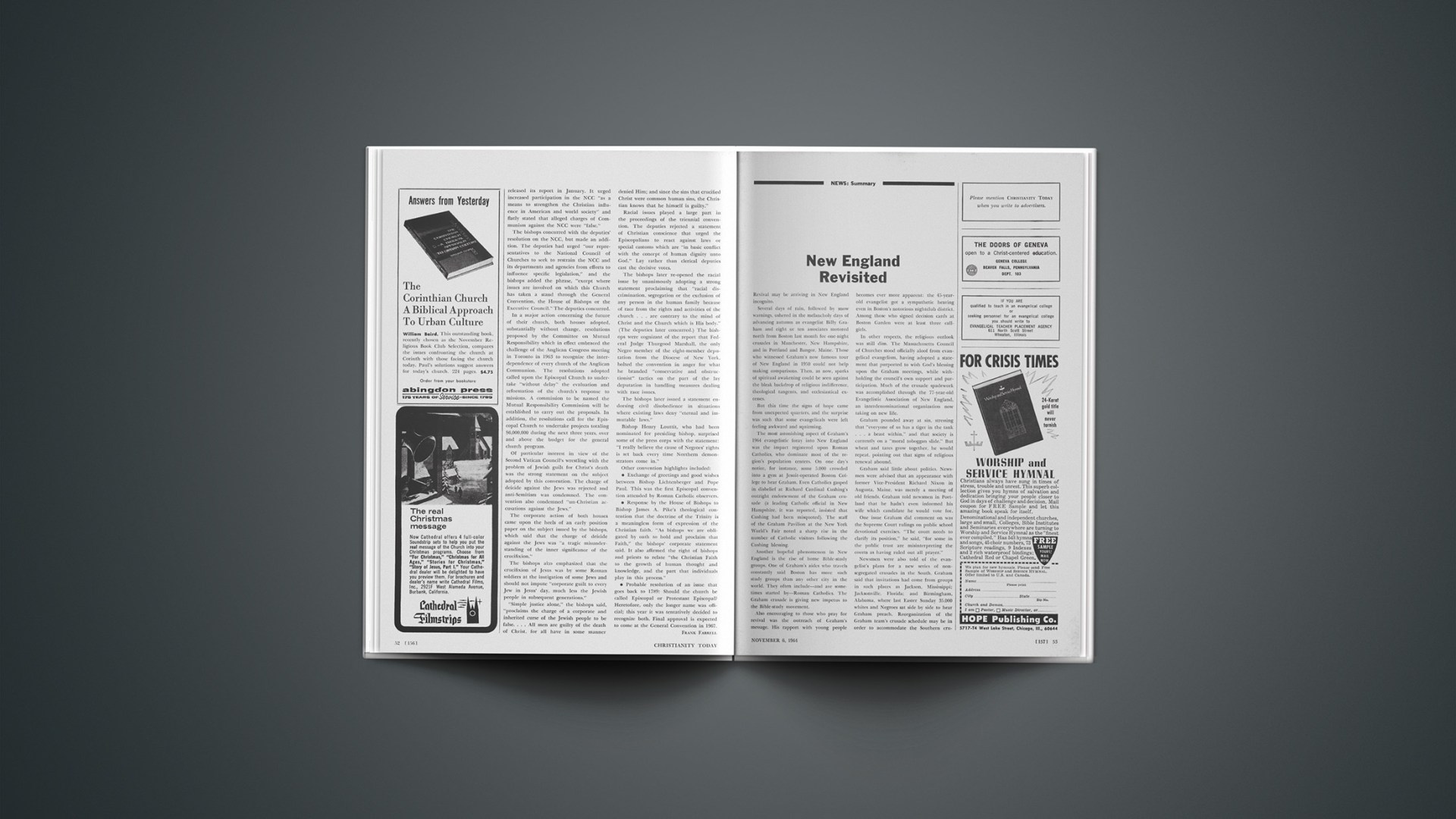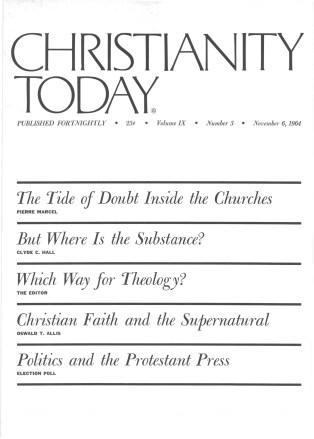Revival may be arriving in New England incognito.
Several days of rain, followed by snow warnings, ushered in the melancholy days of advancing autumn as evangelist Billy Graham and eight or ten associates motored north from Boston last month for one-night crusades in Manchester, New Hampshire, and in Portland and Bangor, Maine. Those who witnessed Graham’s now famous tour of New England in 1950 could not help making comparisons. Then, as now, sparks of spiritual awakening could be seen against the bleak backdrop of religious indifference, theological tangents, and ecclesiastical excesses.
But this time the signs of hope came from unexpected quarters, and the surprise was such that some evangelicals were left feeling awkward and squirming.
The most astonishing aspect of Graham’s 1964 evangelistic foray into New England was the impact registered upon Roman Catholics, who dominate most of the region’s population centers. On one day’s notice, for instance, some 5,000 crowded into a gym at Jesuit-operated Boston College to hear Graham. Even Catholics gasped in disbelief at Richard Cardinal Cushing’s outright endorsement of the Graham crusade (a leading Catholic official in New Hampshire, it was reported, insisted that Cushing had been misquoted). The staff of the Graham Pavilion at the New York World’s Fair noted a sharp rise in the number of Catholic visitors following the Cushing blessing.
Another hopeful phenomenon in New England is the rise of home Bible-study groups. One of Graham’s aides who travels constantly said Boston has more such study groups than any other city in the world. They often include—and are sometimes started by—Roman Catholics. The Graham crusade is giving new impetus to the Bible-study movement.
Also encouraging to those who pray for revival was the outreach of Graham’s message. His rapport with young people becomes ever more apparent: the 45-year-old evangelist got a sympathetic hearing even in Boston’s notorious nightclub district. Among those who signed decision cards at Boston Garden were at least three call-girls.
In other respects, the religious outlook was still dim. The Massachusetts Council of Churches stood officially aloof from evangelical evangelism, having adopted a statement that purported to wish God’s blessing upon the Graham meetings, while withholding the council’s own support and participation. Much of the crusade spadework was accomplished through the 77-year-old Evangelistic Association of New England, an interdenominational organization now taking on new life.
Graham pounded away at sin, stressing that “everyone of us has a tiger in the tank … a beast within,” and that society is currently on a “moral toboggan slide.” But wheat and tares grow together, he would repeat, pointing out that signs of religious renewal abound.
Graham said little about politics. Newsmen were advised that an appearance with former Vice-President Richard Nixon in Augusta, Maine, was merely a meeting of old friends. Graham told newsmen in Portland that he hadn’t even informed his wife which candidate he would vote for.
One issue Graham did comment on was the Supreme Court rulings on public school devotional exercises. “The court needs to clarify its position,” he said, “for some in the public trust are misinterpreting the courts as having ruled out all prayer.”
Newsmen were also told of the evangelist’s plans for a new series of nonsegregated crusades in the South. Graham said that invitations had come from groups in such places as Jackson, Mississippi; Jacksonville, Florida; and Birmingham, Alabama, where last Easter Sunday 35,000 whites and Negroes sat side by side to hear Graham preach. Reorganization of the Graham team’s crusade schedule may be in order to accommodate the Southern crusade, but the cities have not yet been determined.
In observations on the international scene Graham expressed concern over the Kremlin shakeup. He predicted that the new Soviet leader might well pursue a tougher line.
Graham addressed a crowd of more than 7,300 in Manchester, a southern New Hampshire industrial city of 90,000 population. The Sunday-night rally was held in the city’s largest arena, which was filled an hour before the scheduled start of the service. The overflow crowd sat outside in an adjoining football stadium and listened by a public-address system. The weather was accommodating, two days of intermittent rain having ended that afternoon.
In Portland, the turnout was more than double the 3,000-seat capacity of the city’s largest auditorium. Graham spoke briefly to those standing outside, and George Beverly Shea sang. The overflow crowds were then escorted into two nearby churches, which were wired into the main auditorium’s amplification system. Later that night, Shea was stricken again with an allergy that had prevented his appearance in Manchester.
Bangor, with a population of about 40,000, was the smallest of the cities visited. More than 7,000 people jammed the Bangor Municipal Auditorium, and an undetermined number were turned away. Graham called attention to the Vatican Council’s new reaffirmation of the biblical teaching on hell, then asked, “Is it worth the chance?”
Graham was scheduled to close his 1964 New England crusade with a rally in Providence, Rhode Island, on October 28.
Protestant Panorama
The Young Women’s Christian Association voted to “open up voting privileges to all dues-paying members seventeen and over whether they had subscribed to the organization’s Christian purpose or not,” noted the YWCA’s annual report.
The Methodists and the Evangelical United Brethren scheduled a joint convention in November, 1966, to vote on their proposed merger.
The Board of Trustees of Davidson (N. C.) College took tentative action to require all faculty members to state their belief in “the fundamental teachings of evangelical Christianity.”
Miscellany
The Vatican will shortly resume negotiations with the government of Czechoslovakia in order to reach an accommodation similar to the recent Vatican-Hungarian agreement, press reports indicated. The chief purpose is to make possible nominations to the dioceses in Bohemia, Moravia, and Slovakia.
An American archaeological team, headed by Princeton University Professor Phillip C. Hammond, Jr., completed the initial stratigraphic charting of the ancient city of Hebron and uncovered artifacts and architectural remains from every period of the city’s history of occupation.
The East German “National Defense Council” announced that objections to serving in the armed forces on “religious or similar grounds” will now be recognized.
World’s Fair pavilion totals at the end of the first season: Billy Graham Pavilion, 2,250,000 visitors; Protestant and Orthodox Center, 1,635,000; “Sermons from Science,” 560,000; “2,000 Tribes,” 542,000; the Vatican Pavilion, displaying Michelangelo’s Pietà, 13,823,037.
Dr. Gaston Cruzat, Latin American press officer at the Vatican Council, was fired after releasing contents of a memo, signed by fifteen cardinals, objecting to tactics of conservative members of the Curia to weaken council statements on controversial issues.
Personalia
Dr. Martin Luther King, Jr., Baptist minister and civil rights leader, was awarded the Nobel Peace Prize for 1964.
The Rev. Ian M. Hay was named the Sudan Interior Mission’s home director for North America.
Dr. Edward W. Bauman, 37, professor of theology and television Bible teacher, was appointed pastor of the historic Foundry Methodist Church in Washington, D. C.
Dr. James N. Bedford was elected president of Buffalo Bible Institute.










